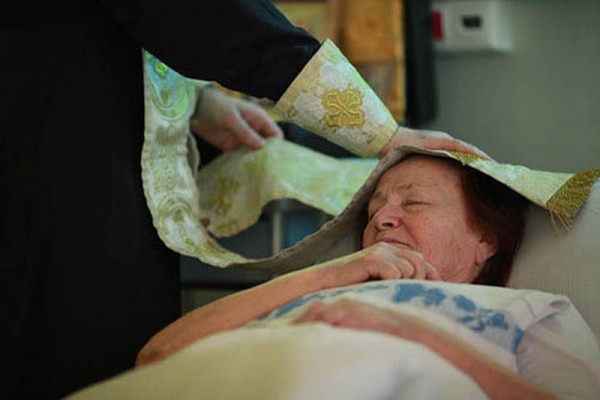When I speak of the pastoral care of the sick and dying, I will do so on the basis of various kinds of human experience which I had in my own life: on the one hand, I have been a physician for 15 years; on the other hand, I have been ill for about 25 years, and I have been a priest for an equal number of years. So when I speak of illness or death, I will do so probably at the same time from several angles.
I should like to mention first an old monastic saying that has gone very wrong: The ascetics of the ancient Church used to say: “Remember death!” The saying has remained but the attitude of Christians has changed in a very sad way. There was a time when death was perceived by Christians as the birth into eternal life. There are more than one passages in St. Paul to bring that out. “For me life is Christ and death is a gain”; “I do not want to be divested of temporal life but clothed with eternity”, which is not the attitude of the ordinary Christian of our day. Death is expected with fear, and not only for the right reasons: not because Christians see that beyond death is the final judgement, but because neither the individual Christian nor the Christian community is capable of saying with the Holy Spirit of God: Come, Lord Jesus, and come soon! And yet the thought of death was not meant to be a scare. As I hope to be able to point out, the thought of death is the only way of living up to life with all the greatness of man. As long as a person is not great enough for death, he is too small for life. Let this be a general introduction to what I want to say.
When a person falls ill, several things happen to him. First of all, the person discovers that the body is him or her. Usually, people live as though they were spiritual beings using a body which is of little importance. An illness compels us to recognize that our body is as much ourselves as our souls. The second thing we discover in being ill is that we are completely helpless and depend on the mercy of God and the compassion of other people. The third thing always coming to mind of a sick person is that death may be the final result of the illness. I am, of course, not speaking of trivial illnesses like an ordinary cold. But whenever an illness is severe, or whenever it is not clear what the nature of the illness is, the thought of death comes and it is not always recognized or allowed to come. At this point, what is our pastoral situation?
First of all, our relationship with our people must be such that our coming into a house should be considered as normal and as a joy. There are still too many homes in which the coming of a priest to a sick person is almost like a warning that death may be at the gate. That means that the pastoral care for the sick begins in good health, by establishing a relationship of friendship and simplicity. That includes that we must be able to put into words what the person is afraid of expressing — not in a frightening way, but in a matter that will allow the person to face up to all his problems. I remember a hospital chaplain, during the war, who used the illness of people to frighten them into a return to religion. This is not to be done. But we must have the courage and the tact to enable a sick person to speak of his fears, because one of the greatest difficulties for him lies in the isolation which the fear of speech creates. There are many persons thinking that they are afflicted with a mortal illness who dare not ask the question because they are afraid of the answer. A first visit to a sick person could be a beginning of truth. First of all, the person to whom you have come needs to be recognized with interest and concern. There is nothing so destructive for the spiritual condition of a person as the visit of a priest who comes, sits down and looks at his watch. You may be in a hurry, you may be going to another place, but the person with whom you are must feel that all the time you are with him or her, you think of no one and nothing else. The very thing you must learn is to look at the person and to listen to the person. During the whole conversation be aware not only of the words spoken but of the expression of the eyes, of the face and of the voice. You may well hear very courageous words spoken in a very frightened tone of voice, and we must be able to answer the fear or the question behind the words, and not only the words spoken. According to the kind of relationship we have with this person, we can act in different ways: If we know the person well enough, we may say: “No, be truthful, do not play the comedy with me. Let us speak simply: you are afraid — what is the matter?” If we know the person less or if the relationship is not deep enough, we must find a way of conveying our understanding without hurting the person.
I remember having visited a very frightened person who resisted every attempt at simplicity or directness. Then I used a strategy: I said to this person that it was wonderful that there was no danger of death or severe illness in her case. And then in the course of the conversation, I told her of my mother’ s death. The person in my presence was ill with cancer as my mother had been. We spoke a long time about everything that had been my experience with my mother. And in the end this person said to me: “Do you think I could face death the way your mother did?” And then we could speak of her and not of my mother.
There are people who are aware that their illness is severe and may lead to death: they have got problems of life, are afraid for their families and are concerned for their work. They always fight to get out of hospital or out of bed as soon as possible. And one of the things we should do is to convince them to be still and quiet. I remember a man who was in this condition and said to me: “I must get well, I have so much to do in life!” I remarked to him that in the course of the last ten years he had been telling me all the time how much he wished he had a few weeks to do nothing except to be. “You never did anything yourself to obtain these weeks; God has given them to you, take them!” “But how shall I use them?”, he said. “Just be still, be calm, be peaceful.” And then we began to speak of the contents of these weeks. This man was to die within a few months. He did not know that yet, but I knew. I pointed out to him that health or life or death depend very much on moral and psychological factors — that there are not only psycho-somatic illnesses, but that we have within ourselves mental situations that are killing: for instance hatred, bitterness, guilt; and I suggested to him that if he wanted to live and to be whole, he should resolve all these problems and give his body to the doctors who would do all the necessary for him. So for weeks on end we went into all his present and his past. He discovered that he had a bad relationship with his sister, that he had a bitter feeling about years past, that he had a sense of guilt about things done. Gradually we worked together to resolve each of these problems of the present and the past. He made his peace with God, he made his peace with all the people who were accessible to him; and then he made his peace with all his past, with people he could no longer attain. And one could see that step by step his soul that had been heavy and repressed began to come to life like grass when rain is pouring on it. Yet in the meantime his body was dying out. He had become terribly thin and weak, and at the moment when he could no longer get out of his bed, he said to me: “It is extraordinary, my body is dying and yet I have never felt so intensely alive’. He had become aware of the fact that the life that was within him did not depend on the condition of his body. And when at that point we began to speak of death, he smiled and said: “But when my body dies, life cannot be taken away from me. The life I feel in me is not rooted in my body.”
From this I would like to draw one or two conclusions: Preparing someone for death is always a mistake. One must prepare people for life. It is only when someone has been brought to understand the abundance of life — the fact that life is rooted in God, and not in one’s body — that he can face death. And this preparation for death in terms of life must begin soon. We must realise that we are all afflicted with a mortal illness which is called mortality. And the sooner we realise that we are dying people, and yet that death has no power over us, the better. Now, there is a reason why one should prepare for death early in life: There is a moment in life which depends either on age or health, when we begin to feel that our body is decaying, that our physical strength is going, that our mind is no longer as al… (?) as it was, that our feelings may not be as live as they were in our youth. At that moment, there is a danger of confusing death with decay; to imagine that death is the ultimate result of a gradual decay and that death is really final destruction. If we think of death when we are a great deal younger, when death is not yet at work in our bodies, we can face it as a challenge of life. I remember my father telling me: “Whether you are alive or dead, does not matter; what matters is whether you are prepared to live for and to die for.” It is not life or death: it is the content of life and the challenge of death that matter. There is another saying my father’s: “Wait for your death as a young man waits for his fiancée!” That is the preparation that means facing life with ultimate daring and courage. It is an attitude which means that there are values so great that death is nothing compared them. In terms of a believer, it would mean love — the love of God, the love of neighbour. In secular terms it may be an ideal. Anything which we are prepared to serve and not to use can give us enough greatness to face death.
I think these are the main principles of our approach to a pastoral meeting the sick and dying. Of course, there is a great deal more to be said about various situations, but here are the basic principles. It is by teaching people to live in the full measure of God’s life and the whole scale of the greatness of man, we can help a person to face death after he has faced life. People who are afraid or incapable of facing life creatively and daringly, cannot be expected to face death creatively and victoriously. But at the same time, it is only facing death the way we face it — that can give us the certainty to be able to face life up the last measure of risk, and this is what we are called to do: to have such possession of life and death that we can say with St. Paul: “To live for me is Christ and to die is a gain.”
Answer to questions in the discussion, following the lecture:
The SACRAMENT OF UNCTION is not specifically a sacrament for the healing of body alone. If you look at the presuppositions, you see that a person should make a full confession of all his life. And a confession of life does not mean simply to give you a list of everything happened in the course of the last 60 years. It means going through a whole process of clearing away all the wrong there is. The prayers of the Service of Unction make it clear that we expect the healing of the soul that will overflow, if God wills, into the healing of the body. I think that the use of the Sacrament of Anointing for nothing else but a possible healing of the body is a mistake: it is not a form of clerical medicine. It is a real act of pastoral care. We may discover in the process of preparing the person helping him to reach again wholeness and integrity of soul and spirit, that he or she may say: “I feel so transformed that it does not matter to me any more whether I live or die, whether I am healed physically or not.”




















